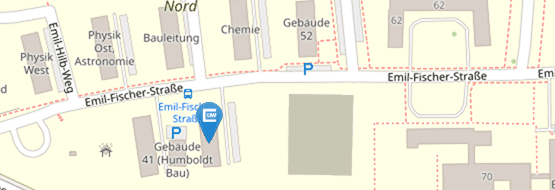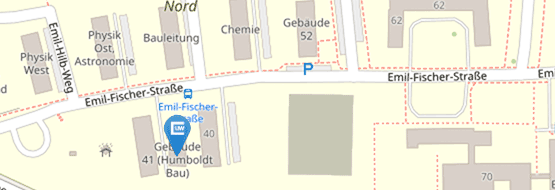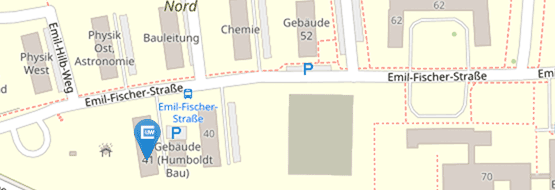Computational Mathematics (Master)
Master Program of Computational Mathematics
| Degree: | Master of Science |
| Target duration: | 4 Semester |
| Academic term: | Summer and winter semesters |
| Admission: | Free admission, but subject-specific admission requirements |
| Credits: | 120 ECTS points |
| Target group: | Successful graduates of a bachelor's degree program in Computational Mathematics or Mathematics with a specialization in Biology, Chemistry, Computer Science or Physics |
| Qualification targets: | Qualification targets Master Computational Mathematics (120 ECTS) |
| Akkreditation: | program accredited till September 30, 2028 |

Please consider:
The master program Computational Mathematics can be started in summer term 2025 for the last time!
Aspiring Mathematicians should
- become familiar with the characteristic methods of mathematical reasoning,
- acquire comprehensive knowledge of the methods of pure and applied mathematics
- independently arrange and solve mathematical questions
A study of mathematics promotes the
- Ability to think abstractly
- Skills to address complex issues
- Perseverance and creativity in solving problems
The Bavarian Higher Education Act (BayHSchG) requires a "special qualification" for enrolling in a Master's degree program.
For the master's program Computational Mathematics at the University of Würzburg, substantive requirements are set:
- Bachelor's Degree in Computational Mathematics, Mathematics with application in Chemistry, Computer Science or Physics, as well as Mathematical Physics with 180 ECTS points or a comparable Degree Program,
- Competences amounting to at least 60 ECTS credits in the following sub-areas of mathematics: calculus (differential and integral calculus in one and more variables), ordinary differential equations, partial differential equations, vector analysis, function theory, linear algebra, algebra, geometry, discrete mathematics, functional analysis, stochastics,
- Competences amounting to at least 20 ECTS credits in the following subareas of applied mathematics: numerical mathematics, modeling, scientific computing, optimization, operations research, computer-oriented mathematics, programming for mathematics students,
- Competencies amounting to at least 10 ECTS credits in the above-mentioned or other areas of mathematics.
- Competencies amounting to at least 20 ECTS points from modules in Biology, Chemistry, Computer Science, Aerospace Informatics or Physics,
To enable an uninterrupted transition from undergraduate to postgraduate study, a "conditional" admission can be applied, provided that one of the degrees mentioned in point 1 above can be used to prove the acquisition of 150 ECTS credits. The requirements mentioned from 2 to 5 must be achieved in any case. For a final admission to the Master's degree program in Mathematics, the requirements listed in 1 must be submitted before the end of the registration deadline for the third semester.
Deadlines
The following deadlines must be met:
- Until July 15 (if applying for the winter semester) or until January 15 (if applying for the summer semester), an online application must be submitted under WueStudy. JMU students can use their JMU account, external applicants must first register for an applicant account. (Since December 9, 2021, the online application will no longer be made on the JMU Master's portal.)
- Until September 15 (if applying for the winter semester) or until March 15 (if applying for the summer semester), proof of first degree or proof of performance can be submitted later.
Attention: application for a semester after the deadlines July 15 and 15 January, respectively, is not possible. On the other hand, documents can be submitted by the second specified deadlines. After receiving your online application on the Master-Portal, we will contact you by e-mail and let you know the status of your application.
Information and contact
Advisers are available for questions about the aptitude test and the mathematical study. Once per semester, there will be an information session of the study counseling, which is held before the application deadlines.
Mathematicians easily achieve good career prospects, both in situation of economic stability and difficulties. According to STERN, "the entire unemployed mathematicians in Germany would at most fill a bus". A degree in mathematics attests to the ability of the graduates (whether Mathematics, Financial Mathematics, Computational Mathematics or Mathematical Physics). Indeed mathematicians
- are able to work within complex contexts quite quickly,
- identify the core of a problem and separate what is not essential,
- find creative solutions,
- use profound mathematical expertise and techniques that are not typical of graduates of other programs.
All these characteristics combined with visible knowledge of the needs of the "mathematics users" results in the entry ticket to a crisis-proof workplace. Indeed mathematicians can integrate several applied subjects in mathematics for the sector of economics and finance, making use of typical tools of Financial Mathematics. Similarly mathematicians of Mathematical Physics and Computational Mathematics can apply their knowledge in natural and engineering sciences.
Starting in winter term 2024/2025 there have been changes in the subject-specific provisions, which only affects the module catalogue. Therefore see the provisions 2019 for the structure of the study and consider the additional modules of the changes in 2022/2023.
You find the new subject-specific provisions here.
Starting in winter term 2022/2023 there have been changes in the subject-specific provisions, which only affects the module catalogue. Therefore see the provisions 2019 for the structure of the study.
You find the new subject-specific provisions here.
Structure
- The Master's program Computational Mathematics is divided into the compulsory modules Numerics and Optimization (30-60 ECTS), Mathematics (10-40 ECTS, including Learning by Teaching), Seminars and Workshops (10-40 ECTS), an area of application and practical training (10 40 ECTS) and the final degree (30 ECTS).
- In the master's program of Computational Mathematics there are five optional applied subjects (biology, chemistry, computer science, aerospace computer science, physics).
- You can integrate an optional internship (10 ECTS).
Specifying a course of study makes little sense here, as there are no compulsory modules and no restrictions. The modules are free to choose according to the above conditions.
Control test
A control examination does not exist in this master program.
Thesis
If you have earned 120 ECTS credits under the Examination Regulations, you will receive the academic degree of Master of Science.
Study and examination regulations
- General Study and Examination Regulations for Bachelor and Master Courses (ASPO)
- Subject-specific provisions for the Master's program Computational Mathematics (PO 2019)
The examination board is u.a. responsible
- Recognition questions at the beginning of studies for achievements acquired in previous study programs or at another study location,
- Recognition questions in the current study
- Gender Equality
There are no compulsory modules in the Master program Computational Mathematics. The elective area (90 ECTS) is subdivided into the subareas:
- Numerics and optimization (30-60 ECTS)
- Mathematics (10-40 ECTS, incl. Learning by Teaching and Internship)
- Seminar and working group area (10-40 ECTS)
- Area of application (10-40 ECTS)
Possible integrated applied areas are:
- Biology
- Chemistry
- Informatics
- Aerospace Computer Science
- Physics
A list of all possible modules can be found subject-specific provisions or in the module catalogue.
You will find information about the current offer in the course catalog.
Learning by Teaching means supervising an exercise or tutorial group in the bachelor's program under the guidance of the respective lecturer. This can be done twice for every 5 ECTS.
These modules require appropriate skills. Application is made directly to the teaching coordinator.
The optional internship (10 ECTS) is a practical activity in business, industry, research or administration, which should have a duration of about 300 hours.
Prior consultation with a supervising lecturer is urgently required to ensure that the internship complies with minimum content requirements.
The master's thesis is the last major exam in your master's program. This written work is designed to show that you are able to work on a (mathematical) problem in a defined period of time (six months).
The master's thesis can be started at any time.
At the very earliest, you should start your Master's thesis before the beginning of your 6th semester, so that you can still use the full processing time to complete the work before the beginning of your 7th semester (at the beginning of the 7th semester, your master's degree program will not be considered as the first passed!).
The topic of a master's thesis usually results from a seminar or a working group. In accordance with your mathematical interests (see Overview of the Chairs of the Institute of Mathematics), you should personally contact a lecturer in mathematics and define a topic directly with him / her (your own suggestions are possible!). Potential supervisors are all lecturers in mathematics. If you have found a supervisor and a topic for your thesis, print out this form, fill it out together with your supervisor and hand it over to Ms. Schmid (Mathematik Ost, Zi. 00.016). This will make the topic of your thesis and the date of submission (date of issue of the topic + 6 months) official and binding.
Only in well justified cases (examination inability, with certificate!) The processing time can be extended on application with the examination board and in consultation with the supervisor.
For regulations concerning passing the thesis to the university see here.
There is no colloquium for the Master Thesis.






